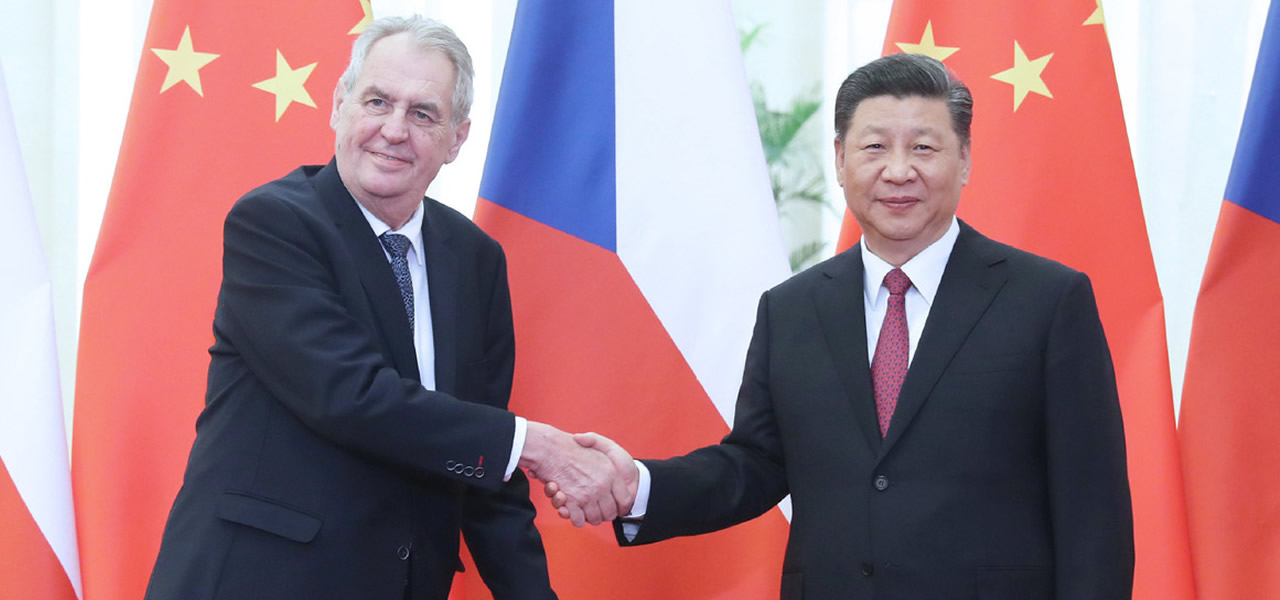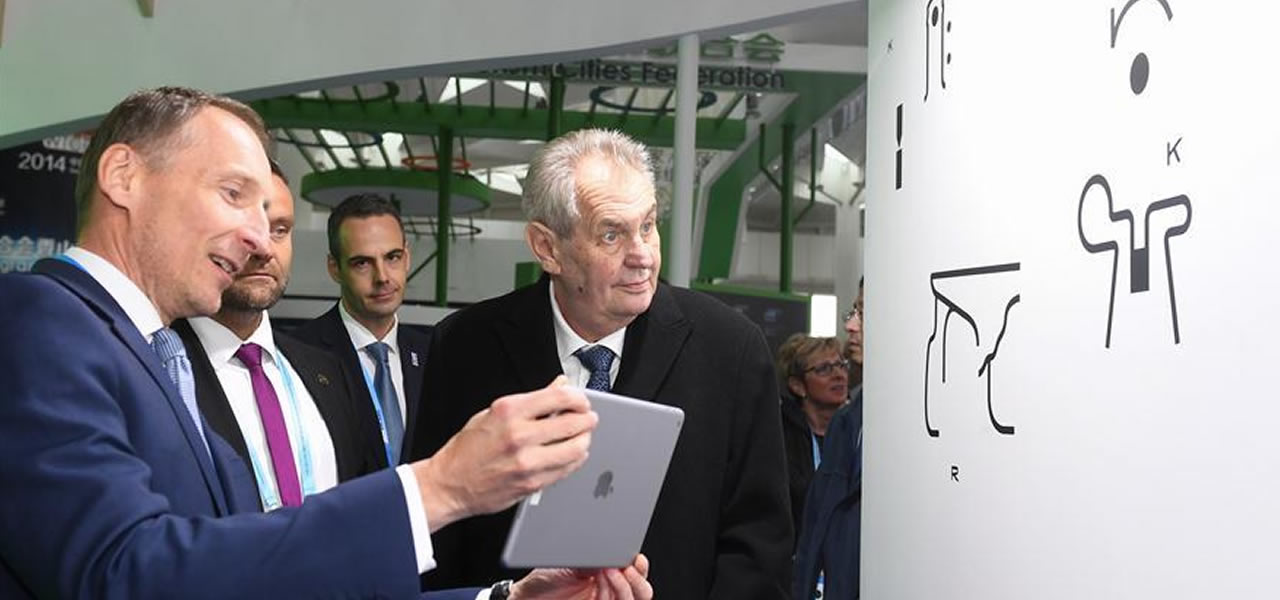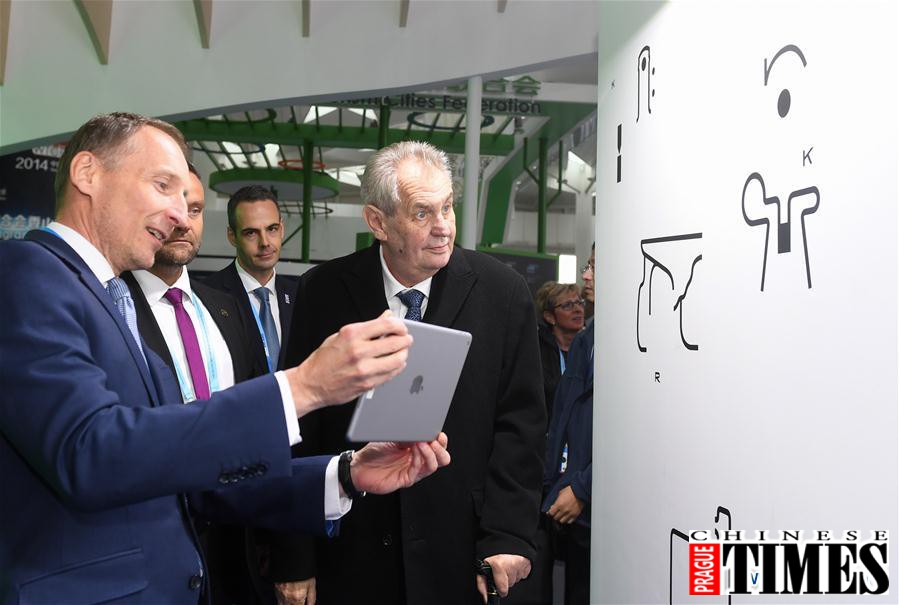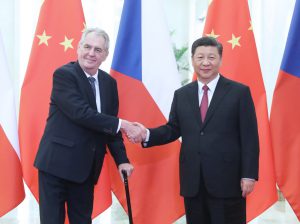President Xi Jinping meets with Czech President Milos Zeman in Beijing, April 28, 2019. [Photo/Xinhua]


President Xi Jinping meets with Czech President Milos Zeman in Beijing, April 28, 2019. [Photo/Xinhua]

Czech President Milos Zeman visits the Czech Republic booth at the International Pavilion of the International Horticultural Exhibition 2019 Beijing, in Beijing, April 28, 2019. [Photo/Xinhua]

China Esteran Airlines
A worker of New Zealand dairy company Theland works in the ranch. The company has seen its sales revenue surge 309 percent during the first quarter of this year, after its presence at the first CIIE. [Photo/China Daily]
As the first batch of exhibits set sail for the second China International Import Expo, companies attending the show have pinned high hopes on the upcoming six-day exhibition.
According to the CIIE bureau, the first exhibits for the show, which will be held in Shanghai from Nov 5 to 10, were shipped from northwestern Italy’s Genoa Port on Sept 2. Exhibits from Vanuatu and Czech Republic were also shipped in early September.
The shipment from Italy is mainly made up of cosmetics, nutrition products and traditional Italian bread, which need to be delivered under constant temperatures throughout the journey to China. The products are expected to arrive in Shanghai in early October.
To ensure that exhibits are handled properly and efficiently, COSCO Shipping has specially designed a one-stop solution that covers clearance, goods pickup, packaging, temporary warehousing and cold-chain shipping, said Wang Songwen, vice-general manager of COSCO Shipping Europe.
Up till now, more than 3,000 companies from over 150 countries and regions have signed up for this year’s show, many of which participated last year.
UK luxury electrical wiring accessories manufacturer Focus SB brought its products to China for the first time via last year’s CIIE. Many of the products ordered during the show were for the new VIP lounge at Shanghai Pudong International Airport which was recently completed in early September.
According to Focus SB, the company forged cooperative deals with five Chinese domestic dealers last year and will double its exhibition area at this year’s expo.
During last year’s CIIE, New Zealand dairy company Theland signed contracts worth over 1 billion yuan ($141 million) during the six-day show. Its signature product-the 72-hour fresh milk shipped directly from New Zealand to China-achieved sales topping 80,000 bottles per week earlier this year, which was more than 26 times the volume registered before the show.
“Theland saw its sales revenue surge 309 percent during the first quarter of this year, and this can be largely attributed to the company’s presence at the first CIIE,” said the company’s chairman Sheng Wenhao.
 A grand evening gala is staged on the Tian’anmen Square to celebrate the 70th anniversary of the founding of the People’s Republic of China, in Beijing, capital of China, Oct 1, 2019. [Photo/Xinhua]
A grand evening gala is staged on the Tian’anmen Square to celebrate the 70th anniversary of the founding of the People’s Republic of China, in Beijing, capital of China, Oct 1, 2019. [Photo/Xinhua]
Leaders of foreign countries have sent a multitude of congratulatory messages to Chinese President Xi Jinping to convey their best wishes on the 70th anniversary of the founding of the People’s Republic of China.
Iranian President Hassan Rouhani extended his sincere congratulations to the friendly Chinese people. Iran is willing to work with China to continuously enhance the common interests of the two countries and safeguard world peace and stability, Rouhani said, adding that he wishes China prosperity and its people happiness and health.
Algeria’s interim President Abdelkader Bensalah wishes the friendly Chinese people continuous development and progress. As Algeria and China have established a comprehensive strategic partnership and are working together on the Belt and Road Initiative, the prospects for the development of bilateral relations will be even broader, he said.
Kuwaiti Emir Sheikh Sabah Al-Ahmad Al-Jaber Al-Sabah said China has made great development achievements in past decades, which has consolidated its core position in the world political and economic arena. He wishes the friendly country and people continuous progress and development.
On behalf of himself and the Iraqi people, Iraqi President Barham Salih said that he would like to extend his sincerest congratulations and best wishes. Iraq is willing to continuously deepen its friendship and cooperation with China, and fulfill the two peoples’ expectations of prosperity and development, he added.
Israeli President Reuven Rivlin said that under the leadership of the Communist Party of China, China has made great achievements that have attracted worldwide attention. Israel attaches great importance to good relations with the nation and is willing to work with it to continue to build and strengthen their innovative comprehensive partnership, he said.
Ugandan President Yoweri Museveni said that the old generations of Chinese leaders, including Chairman Mao Zedong, risked their lives and worked hard for the freedom and prosperity enjoyed by the Chinese people today. “I am willing to commemorate their contributions and courage with you,” he added.
Nigerien President Mahamadou Issoufou said that under the leadership of the CPC, the Chinese people have built China into a prosperous, democratic and respectable country in the past 70 years, and that he believes the “Two Centenary Goals” and the Chinese Dream of national rejuvenation will certainly be realized.
Ghanaian President Nana Akufo-Addo said the Ghanaian people join the Chinese people in celebrating the birthday of the PRC, and in recalling the heroes and martyrs who have laid the foundation for the development and progress of China. China’s implementation of reform and opening-up has accelerated its transformation and brought more benefits to its people, he noted.
Mozambican President Felipe Nyusi said China enjoys a long history and a civilization dating back thousands of years. He added that the PRC, since its founding 70 years ago, has set an example in making tremendous achievements in various fields, especially in reducing poverty and improving its people’s livelihood.
Namibian President Hage Geingob greeted the brotherly Chinese people with the warmest congratulations, saying that Namibia will continue to develop its relationship with China.
Serbian President Aleksandar Vucic said that China, guided by its visionary leaders, has grown into one of the most respectable partners in the world and has made important contributions to world peace and development, adding that he believed the country will surely realize the Chinese Dream.
Czech President Milos Zeman said that the Czech Republic, together with other countries in the world, has witnessed the growth of the PRC into a major country. He wished the Chinese people even greater success.
Finnish President Sauli Niinisto said that the 70th anniversary of the founding of the PRC was a landmark, and China’s development speed and its rapidly-rising leading role in the global economy would have a broad and positive influence over the world.
Other leaders sending congratulatory messages to Xi include Milorad Dodik, the Serb member of the tripartite presidency of Bosnia and Herzegovina; Slovenian President Borut Pahor; Argentine President Mauricio Macri; Chilean President Sebastian Pinera; President of Trinidad and Tobago Paula-Mae Weekes; Emperor Naruhito of Japan; Sultan Haji Hassanal Bolkiah of Brunei; Myanmar President U Win Myint; Malaysian Supreme Head of State Abdul Halim Mu’adzam Shah; Afghan President Mohammad Ashraf Ghani; King Mohammed VI of Morocco; Tanzanian President John Magufuli; and Eritrean President Isaias Afwerki.
Xinhua
14 June 2019
Good morning. Welcome to today’s discussion.
The ongoing China-US trade dispute is causing growing concern in the world. The health of relations between the two biggest economies affect not just the interests of the two countries themselves, but also the well-being of the entire world. Everybody is, therefore, a stakeholder.
Unfortunately, since the Trump administration came to office, it has kept taking unilateral and protectionist measures and practiced economic hegemony. In particular, it has frequently resorted to the use or threat of tariff as a weapon against other countries.
Like others, China has been a victim of US trade bullying. To safeguard our national interests, we cannot but respond with forceful measures. Our positions have been laid out very clearly in the two documents before you. One is the white paper on China-US trade talks, the other is the latest research paper from the Chinese Ministry of Commerce on how the US has benefited from its trade with China.
They are intended to give you China’s perspective about the real picture of China-US trade relations. You can find detailed analysis and authoritative statistics in both papers. My colleagues and I are also prepared to exchange views with you about them in the course of our discussion.
To start our discussion, I wish to share with you several observations:
First, trade is mutually beneficial.
China has benefited from trade. That is why we are so committed to opening up. The United States has also obviously benefited from trade.
It would be too simplistic to define trade relations solely by trade imbalance. Such an approach is neither objective nor responsible.
Here I am reminded of what Mr. Roberto Azevedo, WTO Director General said in his speech at the opening ceremony of the first Import Expo in Shanghai last November:
“trade is not a zero sum game, where exports are good and imports are bad. In fact, imports mean greater choice for consumers at lower prices. They mean you can focus on producing those goods where you have a competitive advantage and they mean having a more competitive and more efficient economy. And increasingly imports mean inputs for your own products which will themselves then be exported. This is the reality of global trade. Today, around two thirds of all exports around the world contain imported components.”
Martin Wolf has also pointed out in the Financial Times that “the US focus on bilateral imbalances is economically illiterate.”
Moreover, the US trade deficit has been exaggerated. In fact, this problem has been there for decades.
At present, nearly 53% of China’s trade surplus with the United States has come from processing trade. Twenty years ago, it was 70%.
I remember very well that in April 1999, and that was still before China’s accession to the WTO, then Chinese Premier Zhu Rongji visited the United States and gave a speech at MIT. He talked about processing trade and cited sports shoes as an example. He had sent his secretary to department stores to find out the price of sports shoes made in China. One pair of Nike or Adidas shoes was sold at 120 dollars in the United States. The Chinese factory that made the shoes sold it at 20 dollars in China. And the Chinese worker earned only 2 dollars.
China benefited from this trade activity because it produced jobs, but the larger share of profits actually went to the US businesses who were responsible for the brand, design and marketing. However, in their statistics, everything was counted as China’s export to the US.
Second, trade dispute hurts the United States itself and harms the whole world.
Economist magazine has recently published a cover story entitled Weapons of Mass Disruption. It says that “America is aggressively deploying a new economic arsenal to assert its power. That is counterproductive—and dangerous.”
What the US is doing now toward China hurts its own interests. It raises the cost of production for US enterprises. It increases the prices of goods from China for US consumers. It affects US economic growth and people’s living standards. And it impedes US export to China.
Just this morning, it is reported that over 600 US companies including Walmart have urged Trump to resolve trade dispute with China. In their appeal letter, they cite estimates from international consultancy the Trade Partnership and caution that additional 25% tariffs on 300 billion dollars in imports would wipe out more than 2 million US jobs. They would also add more than 2,000 dollars in costs for the average American family of four and reduce the US GDP by 1%.
I have also distributed to you the executive summary of 2019 State Export Report released by the US-China Business Council.
I have to admit that I like their report very much. Ten years ago when I was posted in the Chinese Embassy in Washington, I attended many meetings organized by national and regional governors associations. In almost every meeting I had with dozens of US Governors, I always showed them a copy of this annual report from the business council. Because it captures so well the interdependence of the Chinese and American economies and the importance of keeping this mutually beneficial relationship on the right track.
As the latest report points out, “China continues to be important to US economic growth, supporting more than 1.1 million jobs.” It also says that “States across the country feel the effects of the trade dispute”.
But what worries me even more is the adverse impacts the trade tension has on the rest of the world. Everyone could be at the risk of US trade bullying.
US unilateralism and protectionism compromises the rules-based multilateral trading regime. Years ago, it was the United States who insisted that China should abide by WTO rules. China made big efforts to meet the WTO accession requirements. China has become very active in world trade. And now the United States is often seen to be violating or rejecting multilateral rules. Whenever the rules do not fit Trump’s own purposes, he tends to favor withdrawing from the international treaty or organization.
US unilateralism and protectionism threatens global economic growth. The World Bank has lowered its forecast of world economic growth to 2.9%. The IMF has reduced its forecast from 3.6% to 3.3%. According to Lagarde, US-China tariff war will knock 0.5% off global growth, which is about 455 billion dollars, “larger than the size of South Africa’s economy”.
US unilateralism and protectionism disrupts global industrial and supply chains. In a recent interview with CBS news, Tim Cook said that “the iPhone is made everywhere. And so a tariff on the iPhone would hurt all of those countries, but the one that would be hurt the most is (America).”
Once again, it proves the view of WTO Director General that around two-thirds of all exports contain imported components. The US bullying has caused tremendous uncertainty. More and more businesses are concerned about the stability and safety of their supply chains and have to consider relocation of their respective supply chains.
Third, the US side is to blame.
Chancellor Merkel, when speaking at Harvard on May 30, stressed that protectionism and trade conflicts jeopardize free international trade and thus the very foundation of our prosperity. Though she did not mention any specific name, we all know which country she was referring to.
We only need to have a look at Trump’s tweets to get a feel of US credibility or to be exact, its lack of credibility.
Let me just read one of them for you. On February 21, he tweeted: “I want the United States to win through competition, not by blocking out currently more advanced technologies.”
Everyone has seen how his words are matched by his deeds. This is his style with Huawei, this is also his style with trade talks.
Instead of coming to the negotiation table with good faith and mutual respect, the US side has kept raising demands in disregard of China’s sovereign rights. It abuses national security as a pretext to bring down Chinese companies, disrupt normal cooperation and undermine market competition. Tension has thus escalated. Trade talks have suffered severe setbacks.
On the contrary, the Chinese side has shown sincerity and patience throughout the talks. We are not asking for anything special. We want nothing more than just, fair and non-discriminatory treatment. It is like in sports, one may win a match, one may lose a match, but the most important thing is the level playing field. If one attempts to win by banning other competitors from entering the match or even worse by hurting them outside the arena, it is immoral and disgraceful.
More and more statesmen, commentators, economists and people from all sectors have spoken out against such behavior by the US side.
Dr. Mahathir, Prime Minister of Malaysia, for example, has pledged to use Huawei technology as much as possible. He said, the United States and the “West” must accept that Asian nations now produce competitive products and should not “threaten” business rivals.
Professor Michael Jacobides of London Business School wrote in Financial Times that Trump’s Huawei ban could backfire badly and that putting “America first” could ultimately mean the US finishes last.
Let us wait and see what such abuse of power would bring. As one Czech saying goes, kdo jinému jámu kopá, sám do ní padá, meaning he who digs a hole for others will fall in it himself.
Fourth, US trade bullying must be stopped.
Throughout the trade talks, China has followed the principle of mutual respect, equality and mutual benefits. A good agreement has to be a win-win agreement. There is no room for compromise on matters of major principle. We in China don’t look for trouble, but if trouble comes our way, we are not afraid of it.
China will continue to follow its path of reform and opening-up. At the recent Belt and Road Forum for International Cooperation, President Xi Jinping announced a series of major steps including expanding market access for foreign investment in more areas, enhancing international cooperation in intellectual property protection, increasing the import of goods and services on an even larger scale, more effectively engaging in international macro-economic policy coordination, and working harder to ensure the implementation of opening-up related policies.
The ball is in the US court. If they are ready to talk, we’ll talk; if they choose to fight, we’ll keep them company.
Having said that, I still hope the US side will come back to its senses before it is too late. As Martin Wolf has warned, “Today’s attack on China is the wrong war, fought in the wrong way, on the wrong terrain.”
The world people and the world economy deserve something better.
For this to happen, we have to work together. We all need to act, to speak up and to call for more responsible and reasonable behavior.
In this connection, we appreciate the Czech position. In our joint statement on establishing strategic partnership, both China and the Czech Republic have made the commitment to advocate free trade, oppose trade protectionism and stand for resolution of trade disputes through dialogue and consultation.
This also applies to the China-US trade dispute, which is not just an ordinary dispute. It is, in fact, a major question of multilateralism vs unilateralism, and a major question of free trade vs protectionism.
Everyone has a stake in its outcome, and cooperation must prevail as the only viable route to a better future for all.
Czech people believes that trpělivost růže přináší, or in English, patience brings roses.
China has over 5,000 years of history. We have not only sufficient patience, but also the firm commitment and strong capability to meet this challenge.
Hope we could have your understanding and support.
Thank you.
Thanks to the Belt and Road Initiative (BRI), China and the Czech Republic are more connected than ever, resulting in accelerated progress in exchanges and cooperation.
Chinese President Xi Jinping’s historic state visit in March 2016 led to two sides upgrading their bilateral relationship to the level of a strategic partnership. And since then, China and the Czech Republic have enhanced strategic trust, deepened pragmatic cooperation and expanded people-to-people exchanges. Therefore, results have been produced in various fields.
For one thing, bilateral trade has kept increasing. It has exceeded $10 billion for four years in a row. And it reached $16.3 billion in 2018, up by 30.6 percent over the previous year.
China is now the second-biggest trading partner of the Czech Republic, while the latter is China’s second-biggest trading partner in the Central and Eastern European region.
For many Czech companies including Home Credit and Skoda Auto, China is their most important market. One in every four cars produced by Skoda is sold in China.
Last November, President Zeman led a big delegation comprising over 60 Czech companies to Shanghai for the first China International Import Expo. As a result, numerous trade and business agreements were signed.
Bilateral investment has also grown steadily.
According to Chinese statistics, total cumulative agreed investment stood at about $3 billion at the end of 2018, a 10-fold increase from the figure of 2013.
Czech investment in China reached about $300 million by the end of 2018.
From China’s side, A123 Systems, a manufacturer of advanced lithium-ion batteries, established its first operation in Europe in 2017 as it opened a new production facility in Ostrava.
And Yanfeng Automotive Interiors, a global leader in automotive interior solutions, has set up two factories in Zatec and Plana with more than 1,500 employees.
Separately, Bank of China, the Industrial and Commercial Bank of China and Bank of Communications have all set up branches in Prague, facilitating Czech efforts to turn Prague into a financial center serving Central and Eastern Europe.
Travel between China and the Czech Republic has now become much easier with four direct flights linking Prague with Beijing, Shanghai, Chengdu and Xi’an.
Prague International Airport received over 190,000 passengers from China in 2018. And Chinese tourists totaled 620,000 in 2018, making China the biggest source of foreign tourists outside the European Union for the Czech Republic. There are also two freight train services from China to Prague and Pardubice. Also, Chinese companies have set up more overseas warehouses and logistics centers in Prague. And cross-border e-commerce now enjoys robust growth.
Cultural exchanges are also flourishing.
A “Happy Spring Festival” gala performance, a Chinese Movie Week and joint production of films and TV dramas have promoted mutual understanding between the two peoples. And there has also been more cooperation in sports, especially in football and ice hockey.
Retired footballer Pavel Nedved and ice hockey player Jaromir Jagr are actively involved as ambassadors of goodwill. And as China is to host the Winter Olympic Games in 2022, we may expect even more cooperation in winter sports in particular.
In the medical field, the first center of traditional Chinese medicine in the Central and Eastern European region was set up in the Czech Republic in 2015. And now more Czech patients are interested in treatment and care from the East.
Tong Ren Tang, a leading producer of traditional Chinese medicine, now runs a clinic in Prague. And its services are covered by VZP, one of the biggest Czech medical insurance providers.
All these are just a few examples of what the Belt and Road Initiative has brought to China-Czech cooperation.
Since President Xi proposed the initiative in 2013, it has become important that China contributes to global cooperation for common development. And featuring the principle of consultation and cooperation for shared benefit and the vision of green, clean and sustainable development, the Belt and Road cooperation has been increasingly welcomed as a joint endeavor in pursuit of peace, prosperity, openness, innovation and cultural exchange for all participants.
Given its location at the heart of Europe and along the Silk Road Economic Belt, the Czech Republic has a big role to play in the Belt and Road cooperation.
President Zeman will attend the second Belt and Road Forum for International Cooperation in Beijing. And it will be a good opportunity for both sides to further expand converging interests, unleash the potential for bilateral cooperation and strengthen practical cooperation to the benefit of both peoples.
The Czech Republic was among the first to recognize the People’s Republic of China in 1949. And as we celebrate the 70th anniversary of our diplomatic ties this year, we need to build on the strength of this traditional friendship and keep pace with the times to enhance cooperation.
Efforts should be made to promote greater synergy in our development strategies. And we must draw on each other’s strength to step up cooperation in the automotive industry, aviation, machinery, energy and other sectors as well as in the high-tech fields of nanotechnology, laser, digital technology, medicine and biotechnology.
Through the platform of the international import expo, China is prepared to buy more from the Czech Republic and reduce the trade imbalance.
The prospects of cooperation are also bright in tourism, culture, health, education, people-to-people links and sub-national exchanges.
Amid growing uncertainty in the world about trade ties, both countries are resolute in opposing unilateralism and protectionism. And both countries are ready to strengthen dialogue and coordination on major international issues and remain committed to working together under the framework of 16+1 cooperation to boost cooperation not just between Central and Eastern European countries and China, but also between the EU and China.
President Xi and President Zeman planted a sapling of a Chinese Ginkgo tree together in 2016 when President Xi visited Prague. When President Zeman visited Beijing two years earlier, he gave the Chinese president a sapling of a Czech apple tree. Both trees are considered as symbols of the China-Czech friendship and cooperation.
A Czech saying goes that without work there are no kolaches. Similarly, it is necessary for both sides to make joint efforts in order for the trees of friendship and cooperation to bear more fruit. Opportunities are ahead of us, and it is up to us to seize them and work for even greater progress in mutually beneficial cooperation.
by Zhang Jianmin
 Czech President Milos Zeman visits the Czech Republic booth at the International Pavilion of the International Horticultural Exhibition 2019 Beijing, in Beijing, April 28, 2019. [Photo/Xinhua]
Czech President Milos Zeman visits the Czech Republic booth at the International Pavilion of the International Horticultural Exhibition 2019 Beijing, in Beijing, April 28, 2019. [Photo/Xinhua]
BEIJING — President Xi Jinping and his wife Peng Liyuan were joined by foreign leaders and their spouses for a horticultural exhibition tour in Beijing’s northern district of Yanqing on Sunday.
The foreign guests, coming for the International Horticultural Exhibition 2019 Beijing, were received by Xi and Peng at the China pavilion of the expo park and introduced to different exhibitions featuring characteristic plants and unique gardening arts presented by various regions.
The China pavilion not only boasts wonderful gardening but also demonstrates the country’s willingness to pursue a green life and share the benefits of development with the rest of the world, said Xi.
They also visited the gardens of Cambodia, the Czech Republic, Djibouti, Kyrgyzstan, Myanmar, Nepal, Pakistan, Japan, Singapore and Tajikistan in the international horticulture zone, and attended a tree-planting ceremony.

President Xi Jinping meets with Czech President Milos Zeman in Beijing, April 28, 2019. [Photo/Xinhua]
BEIJING — President Xi Jinping on Sunday met with Czech President Milos Zeman in Beijing.
China is willing to work with the Czech Republic to elevate the bilateral strategic partnership to a new level by grasping the historic opportunity of jointly building the Belt and Road, Xi said.
He said China appreciates that President Zeman speaks up for the country on China-related issues, including calling for fair and equitable treatment to Chinese telecom businesses.
Xi expressed the hope that the Czech Republic can continue to play a constructive role in promoting China-Europe relations.
Zeman said that the Czech Republic is willing to actively participate in the joint building of the Belt and Road, noting that the country hopes to enhance cooperation with China in economy, trade and investment, and promote people-to-people and cultural exchanges.
He said the Czech Republic supports deepening Europe-China relations.
The two leaders attended a signing ceremony after their meeting.